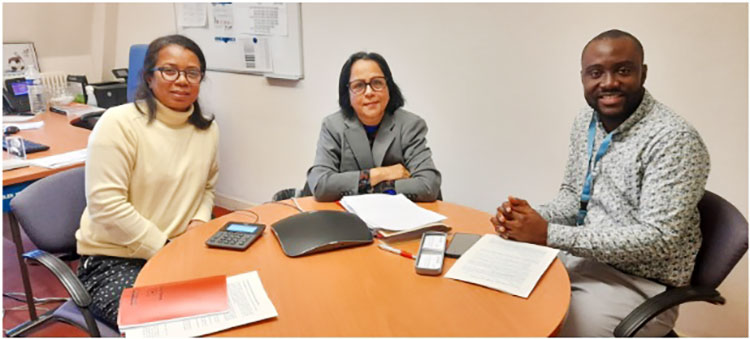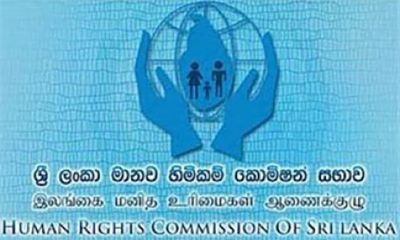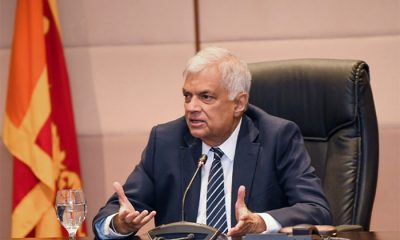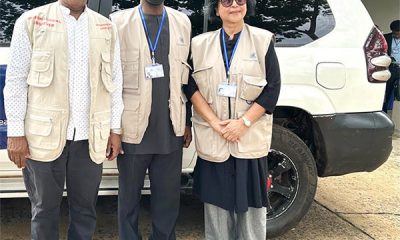News
UPR: Justice Marasinghe deals with post-war issues, economic ruination

Justice Rohini Marasinghe, in her capacity as Chairperson of the Human Rights Commission, has told the fourth Universal Periodic Review (UPR) of Sri Lanka in Geneva recently how short-sighted policies of the previous government plunged the country into unprecedented political-economic-social turmoil and the circumstances leading to the then President Gotabaya Rajapaksa’s ouster.
Justice Marasinghe has dealt with social and economic rights and establishment of a national preventive mechanism.
Declaring that it was the worst economic crisis after gaining independence from the British in 1948, Justice Marasinghe has said that the shortsighted ban on chemical fertilisers ruined the agricultural industry in 2021.
The HRCSL Chairperson has explained how the loss of government revenue due to unwarranted tax concessions granted in the wake of 2019 presidential election, the acute fuel and gas shortage and the disruption of medicine supplies caused by forex crisis led to the public losing faith in the government.
Justice Marasinghe has discussed how closure of schools, mandatory power cuts and high inflation affected the masses in early this year and eruption of violence in the second week of May. Recalling protesters setting fire to house of parliamentarians and officials, Justice Marasinghe said: “Hundreds roamed the streets against the government and its economic policies. They all rallied against the leaders who had steered the country into the worst economic crisis. They were not terrorists nor insurgents, as described by the military. They only demanded what was legitimately entitled from the Government. They expressed anger over the Government’s handling of the economy. They demanded the President’s resignation, forcing him to resign on 14th July 2022.”
Justice Marasinghe has also briefed Geneva of the incumbent government’s declaration that it wouldn’t tolerate protests of any form as the country needed stability.
She has said that the government was making every effort to bring much-needed stability to the country by introducing economic reforms. Asserting that the fuel shortage has been brought under control, Justice Marasinghe said that the situation improved with the restoration of gas supply, reopening of schools, reduced power cuts and the drop in inflation. The HRCSL chief has asserted that the government has introduced what she called well discussed tax proposals to increase revenue collection.
The HRCSL head also briefed Geneva of recommendations it has made to the government following investigations conducted into the economic crisis and the subsequent protests.
She has stressed the need to amend the Human Rights Commission Act to address the contentious issue of non-implementation if its recommendations.
Responding to recommendations from Slovenia, South Africa, France, Thailand, Belgium, and Mexico, Justice Marasinghe has said that the establishment of the Office of Missing Persons (OMP), the National Unity and Reconciliation (ONUR), and the office of Reparation (OR) were meant to address the issue of accountability during the period of the ‘civil war.’
The top HR official said that the government was planning to constitute a Truth and Reconciliation Commission (TRC). According to her, the government has sought advice to have a mechanism similar to that of South Africa. The formulation of the TRC by the Government should be subjected to what Justice Marasinghe called a meaningful dialogue with the victims’ families. She has declared that such a dialogue was essential.
As regards recommendations made by France and Haiti in respect of land held by the military in former war zones, Justice Marasinghe has informed Geneva of the releasing of land over the years. According to her only 275 acres cf State land and 3,000 acres of private land yet to be released. She based this assertion on information received from the North.
As regards establishment of the National Preventive Mechanism proposed by Portugal, Poland, Denmark, Senegal, New Zealand,, Ghana, the UK., Afghanistan, and Cote d’Ivoire against arbitrary arrests and torture or other cruel, inhumane or degrading treatment, Justice Marasinghe has said that National Preventive Mechanism (NPM) was established in the Human Rights Commission and made functional this year.
The unit made 543 visits to police stations, 34 to prisons, and 20 to detention centres. At the beginning, there had been 46 detainees, and now only two remained in the detention centres. (1 LTTE and 1 Easter Sunday attack suspect) . The HRCSL chief explained that the objective of the NPM was to make unscheduled visits to police stations and detention centres. According to her the following recommendations had been made to the government. Repeal the Prevention of Terrorism Act (PTA), amend the General Laws of the Country to deal with the offences of terrorism and amend the definition of terrorist, establish a Truth and Reconciliation Commission and amend the Human Rights Commission Act to ensure the implementation of the recommendations.
News
US sports envoys to Lanka to champion youth development

The U.S. Embassy in Colombo welcomed the U.S. Sports Envoys to Sri Lanka, former National Basketball Association (NBA) and Women’s National Basketball Association (WNBA) players Stephen Howard and Astou Ndiaye, from June 8 through 14.
The Public Diplomacy section of the U.S. Embassy said that it would launch a weeklong basketball program intended to harness the unifying power of sports, made possible through collaboration with Foundation of Goodness and IImpact Hoop Lab.
While in Sri Lanka, Howard and Ndiaye, both retired professional basketball players, will conduct a weeklong program, Hoops for Hope: Bridging Borders through Basketball. The Sports Envoys will lead basketball clinics and exhibition matches and engage in leadership sessions in Colombo and Southern Province for youth aged 14-18 from Northern, Uva, Eastern and Western Provinces, offering skills and leadership training both on and off the court. The U.S. Envoys will also share their expertise with the Sri Lanka Basketball Federation, national coaches, and players, furthering the development of basketball in the country. Beyond the clinics, they will collaborate with Sri Lankan schoolchildren to take part in a community service project in the Colombo area.
“We are so proud to welcome Stephen and Astou as our Sports Envoys to Sri Lanka, to build on the strong people-to-people connections between the United States and Sri Lanka,” said U.S. Ambassador Julie Chung. “The lessons that will be shared by our Sports Envoys – communication, teamwork, resilience, inclusion, and conflict resolution – are essential for leadership development, community building, equality, and peace. The U.S. Sports Envoy program is a testament to our belief that sports can be a powerful tool in promoting peace and unity.”
News
Rahuman questions sudden cancellation of leave of CEB employees

SJB Colombo District MP Mujibur Rahuman in parliament demanded to know from the government the reasons for CEB suspending the leave of all its employees until further notice from Thursday.
MP Rahuman said that the CEB has got an acting General Manager anew and the latter yesterday morning issued a circular suspending leave of all CEB employees with immediate effect until further notice.
“We demand that Minister Kanchana Wijesekera should explain this to the House. This circular was issued while this debate on the new Electricity Amendment Bill was pending. There are many who oppose this Bill. The Minister must tell parliament the reason for the urge to cancel the leave of CEB employees,” the MP said.However, Speaker Mahinda Yapa Abeywardena prevented Minister Wijesekera responding to the query and said that the matter raised by MP Rahuman was not relevant.
News
CIPM successfully concludes 8th Annual Symposium

The Chartered Institute of Personnel Management (CIPM) successfully concluded the 8th Annual CIPM Symposium, which took place on 31st May 2024. Themed “Nurturing the Human Element—Redefining HRM in a Rapidly Changing World,” the symposium underscored the pivotal role of human resource management (HRM) in today’s dynamic global landscape. Since its inception in 1959, CIPM has been dedicated to advancing the HR profession through education, professional development, and advocacy, solidifying its position as Sri Lanka’s leading professional body for HRM.
Ken Vijayakumar, the President of the CIPM, graced the occasion as the chief guest. The symposium commenced with the welcome address by the Chairperson, Prof. Arosha Adikaram, followed by the Web Launch of the Symposium Proceedings and Abstract Book by the CIPM President. The event featured distinguished addresses, including a speech by Chief Guest Ken Vijayakumar, President of CIPM, and an address by Guest of Honor Shakthi Ranatunga, Chief Operating Officer of MAS Holdings Pvt. Ltd., Sri Lanka.
The symposium also featured an inspiring keynote address by Prof. Mario Fernando, Professor of Management and Director of the Centre for Cross Cultural Management (CCCM) at the University of Wollongong, Australia.
Vote of Thanks of the inauguration session was delivered by Dr. Dillanjani Weeratunga, Symposium Co-chair.
The symposium served as a comprehensive platform for researchers to present their findings across a wide range of critical topics in HRM. These included Cultural Diversity and Inclusion, Talent Development and Retention, Ethical Leadership and Corporate Social Responsibility, Adapting to Technological Advancements, Mental Health and Well-being at Work, Global Workforce Challenges, Employee Empowerment, and Reskilling and Upskilling.
The plenary session was led by Prof. Wasantha Rajapakse. Certificates were awarded to the best paper presenters during the valedictory session, followed by a vote of thanks delivered by Kamani Perera, Manager of Research and Development.
The annual symposium of CIPM was a truly inclusive event, attracting a diverse audience that spanned undergraduates, graduates, working professionals, research scholars and lecturers. This widespread interest highlights the symposium’s significance in the field of HRM, offering a unique opportunity for everyone to network and learn from scholarly brains.The CIPM International Research Symposium was sponsored by Hambantota International Port, Sri Lanka Institute of Information Technology (SLIIT), E B Creasy & Co. PLC, and Print Xcel Company.


















